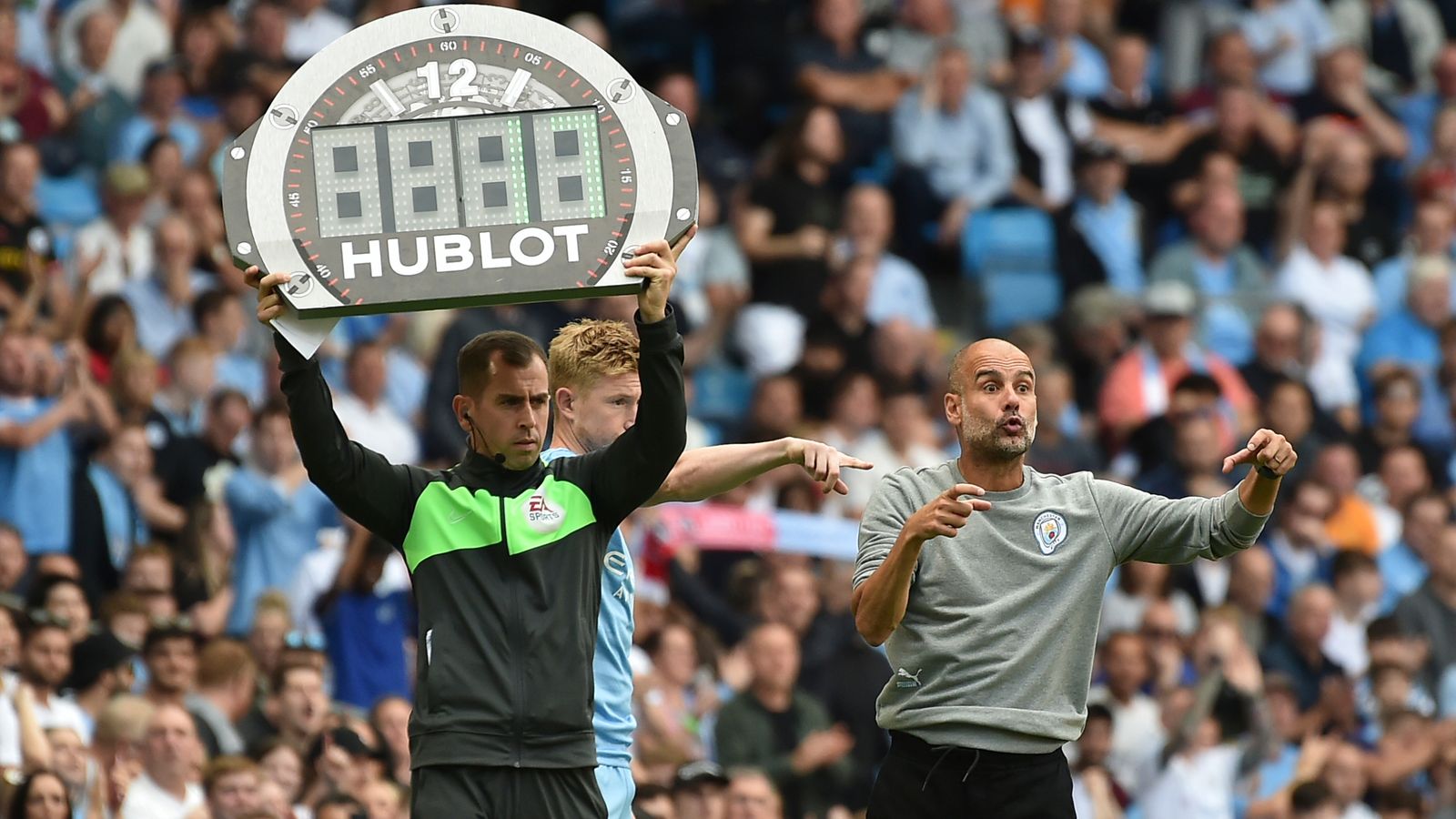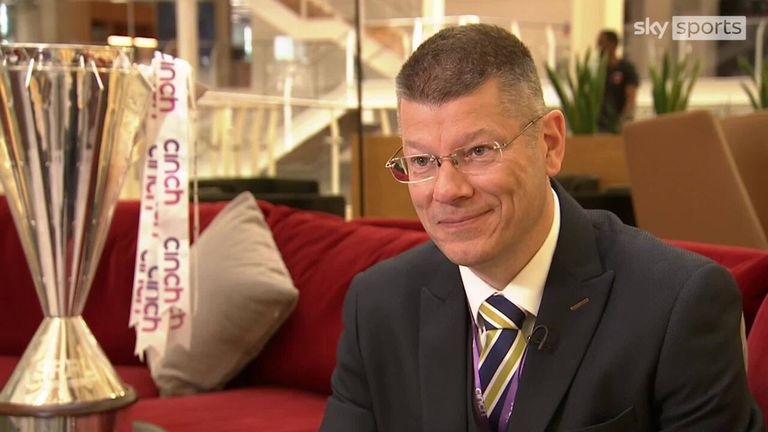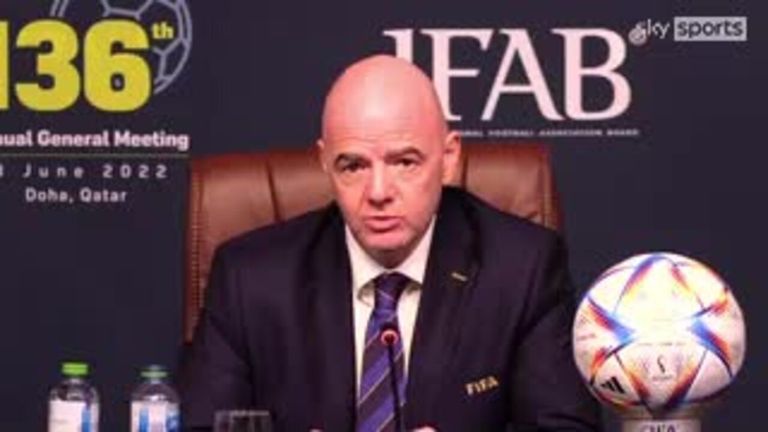
After football’s lawmakers met to discuss the future of the game this week, how different will next season look with a number of changes made to the rulebook?
IFAB, the international board who make and amend the rules of football, and in recent years have overseen changes including the introduction of VAR and the redefining of the handball law, have announced what new legislation will be introduced for the 2022/23 season.
At their recent AGM in Dubai, chaired by FIFA president Gianni Infantino, they decided upon what raft of rules should be changed when the 2022/23 season officially kicks in worldwide on July 1.
Instead of trawling through through all 228 pages of ‘The Laws Of The Game’, here’s the official Sky Sports explainer on what changes to expect across all levels of football.
So is five substitutions the biggest change?
It’s certainly the big news for now. Allowing teams to make five substitutions, an idea which was first introduced ahead of ‘Project Restart’ to help with player fatigue, has now been made permanent.
The move was initially put forward as a temporary measure and last summer was extended until the 2022 to include the Qatar World Cup, but following a recommendation from the IFAB ‘technical and advisory panel’ as well as submissions from a number of leagues and clubs around the world, it has now been written into the laws for good.
Will the Premier League take it on?
Yes – in fact the Premier League voted in favour of reintroducing five substitutions before it was even passed by IFAB. The 20 top-flight teams had, previously, repeatedly voted against the measure, putting the competition at odds with most major leagues around Europe.
However, at the end of March the required threshold of agreement was reached to make the change next season.
How will it be implemented?
As was the case during Project Restart, each team will only have three breaks in play in which to make their five changes – as well as the half-time interval.
How is VAR changing this year?
Even though the era of VAR is still in its infancy, IFAB hasn’t set in stone any changes – but there are still new features in the pipeline.
One of those is ‘VAR Light’, which uses fewer cameras for leagues which cannot afford the full cost of VAR. It has been trialled across leagues in Poland, Kazakhstan, Brazil and France since July 2021, but those tests are still ongoing.
Another change which is more likely to find its way onto the world stage this year is semi-automatic offsides, which uses a similar system to goal-line technology, and was trialled during the Club World Cup back in January.
FIFA president Infantino has said he hopes it will be in place for the World Cup in November, while legendary former referee Pierluigi Collina, now FIFA’s head of refereeing, added he was “very confident” it would be a success.
What else should we know about?
There’s a few other things which have either been agreed on or brought forward – here’s a quick summary:
Bench sizes
The maximum number of substitutes that can be named is being raised from 12 to 15. Only certain competitions, including major continental and international tournaments, have fully utilised that existing limit already.
The increase to a 26-man matchday squad will now raise the question of whether FIFA will in turn increase overall squad sizes to match for the upcoming World Cup in November, just as UEFA did for Euro 2020 last summer owing to Covid worries.
Kick-ins and stop clocks?
IFAB say both of these ideas were “discussed”, with the Dutch football association one of a number of bodies who had requested trials of kick-ins in particular.
Stop clocks would fall under what the body calls a ‘fairer calculation of playing time’, something Infantino has made clear he considers a priority, saying: “It is not acceptable that a game of 90 minutes actually only have the ball in play for 47-48 minutes on average. We have to look into that.”
Trials of both have been given the green light by IFAB, but how they will be implemented, and where those trials will take place, is still in the discussion phase.
Ref-Cams?
After agreeing a lack of respect towards referees was a growing issue among the refereeing community, IFAB has proposed what it calls “a number of initiatives” to address this.
The first to be publicly revealed is the possibility of trialling body-worn cameras on referees at grass-roots level, and IFAB told Sky Sports it has expert panels in place to bring forward further specific measures “in the coming weeks and months”.
Concussion substitutes
This has been on trial for a year now, with teams permitted to take players off when suffering from concussion aside from their normal three changes.
IFAB has now extended the trial to next summer, and has decided against the idea of bringing in temporary substitutes to prioritise removing concussed players from the pitch – and has said it feels further education is needed on when a player should be taken off.
This has been criticised by Headway, the brain injury association. Deputy chief executive Luke Griggs told Sky Sports News: “I’m struggling to understand what more [IFAB] are expecting to learn from extending the trial to 2023.
“It’s confusing and frustrating – Headway has been calling for temporary concussion substitutes and we were a signatory to a letter signed by some of the leading authorities in concussion, which has yet again been ignored.”

